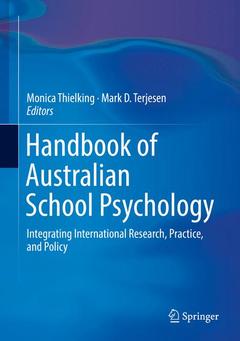Handbook of Australian School Psychology, 1st ed. 2017 Integrating International Research, Practice, and Policy
Coordonnateurs : Thielking Monica, Terjesen Mark D.

- Evidence-based assessment and intervention for dyscalculia and mathematical disabilities.
- Identification and management of adolescent risk-taking behaviors and addictions.
- Understanding and responding to crisis and trauma in the school setting.
- Prevention and intervention for bullying in schools.
- Class and school-wide approaches to addressing behavioral and academic needs.
- The role of school psychologists in the digital age.
- Practical advice for school psychologists facing complex ethical dilemmas.
Synthesizes international school psychology issues and practices within the context of factors unique to Australia
Examines diverse education, training, job titles, and practices of school psychologists in Australia
Explores the demands on service delivery within mainstream metropolitan areas as well as across a vast geographic landscape
Discusses technology-based service delivery options for varied student populations?
Includes supplementary material: sn.pub/extras
Date de parution : 02-2017
Ouvrage de 799 p.
17.8x25.4 cm
Date de parution : 05-2018
Ouvrage de 799 p.
17.8x25.4 cm
Thèmes de Handbook of Australian School Psychology :
Mots-clés :
ADHD and school psychology; Anxiety and school psychology; Autism spectrum disorders at school; Child development and school psychology; Cultural sensitivity and school psychology; Depression and school psychology; Diagnostic practices and educational placements; Evidence-based assessment and school psychology; Evidence-based interventions and school psychology; Group-based approaches to school psychology; History of school psychology in Australia; International trends in school psychology research; Learning difficulties and school psychology; ODD and CD and school psychology; Primary prevention at school; School psychology training and practice in Australia; Social-emotional learning at school; Suicidality and school psychology; Technology-based service delivery in school psychology; Violence and school psychology



